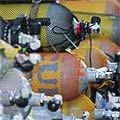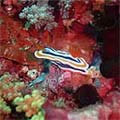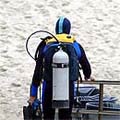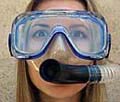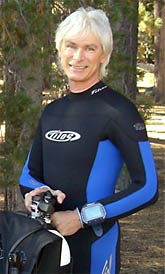« What Santa brought | Main | Of cards »
January 3, 2007
Scuba and fitness
Recently I've thought a lot about how fit you need to be to be a scuba diver. Opinions on this vary greatly. Everyone knows and agrees that being a good tennis player or golfer takes a lot of practice. And few would dispute that athletes and ball players must work out and keep themselves in top physical condition. Things get a bit murkier with sports like auto racing. Does a NASCAR driver have to be physically fit? Some say not, but I tend to believe one must be in top physical shape to withstand the heat and g-forces and manhandling of the pedals and steering wheel over hours of racing.
But scuba? I mean, we constantly point out how wonderful it is to effortlessly float in the water, how our goal should be to expend as little energy as possible, and how nice and relaxing it is down there. During my PADI open water classes I was surprised to learn that, apparently, the average scuba diver is a male in his early 50s who is overweight and smokes. Not exactly the image of a physically fit specimen, and certainly not the image of the young, sleek, suntanned surfer-type scuba divers of both genders we see in ads and commercials.
So do scuba divers need to be fit? In their manuals and course materials, training agencies repeatedly point at fitness as a key requisite for scuba diving. We're not talking specific workouts or training programs, just general good health and a state of fitness. Smoking is a strong negative for divers not only because it affects fitness, but also because carbon monoxide from smoking has a much greater affinity to hemoglobin in our blood than oxygen. Hemoglobin carries oxygen, and that means the extra carbon monoxide in smokers' bodies reduces the amount of oxygen the blood can carry. So smoking before diving is a very bad idea.
But fitness in general? I've read books and articles claiming that scuba diving is among the least physically demanding sports of them all. Just plop in the water and float. I've seen tables that show calories burned while diving and it is supposedly nowhere near as much as for some of the rigorous physical sports out there. Even size and weight isn't that much of an issue. Sure, fat has a greater tendency to absorb nitrogen and the larger amount of nitrogen absorbed can thus play a role in decompression. However, there are a good number of fat divers who are total experts and they manage just fine.
My personal experience so far has been that fitness does matter when it comes to scuba diving, but it matters in a different way. It is absolutely true that gracefully floating underwater requires very little physical exertion. But the same is most definitely not true when it comes to carrying around equipment or gearing up. I am physically quite fit, yet hefting around scuba tanks can be demanding. Even getting up and walking the short stretch from a base camp to the water can be quite difficult. Whenever I see technical divers with dual tanks, I wonder how they ever manage out of the water. And cave divers with all their gear and even more tanks? Try that if you're not in good shape.
I cannot help but feel that the short bursts of energy required to move around in scuba gear have the potential of overwhelming an unfit, or even marginally fit, person. And given that a good percentage of the adult population suffers from chronic lower back pain, I wonder how many of those "typical" middle-aged divers incur back injuries from the equipment.
And then there are exertions one would not even think of, like donning a wetsuit. In my experience, putting on a tight-fitting 7mm wetsuit in warm weather can be equivalent to a major workout. When I put on mine, admittedly a nice and tight fit, I usually sweat bullets and breathe heavily by the time I'm all done and suited up. And unless I rest for a few minutes to catch my breath and cool down before I go under, I suck up half a tank just recovering from gearing up. When I did my NAUI advanced diver checkout dives this past Fall, I marveled at how easily Carol managed to carry and don her gear. It's because as an experienced scuba instructor she is in top shape and used to carrying all that heavy equipment. Fitness does matter.
It also matters in another way. The air in a scuba tank disappears frightfully fast. Due to the laws of physics it gets consumed faster the deeper you go, and there is nothing we can do about that. What we can do is control the rate of air consumption. Heavy breathers can empty a tank in a fraction of the time the same air lasts an experienced diver. That's in part because experienced divers will not needlessly exert themselves, but also because they have learned to control their breathing. And that, again, requires fitness. A fit person is able to return their breathing to normal much faster than an unfit one.
So as far as I am concerned, fitness matters in scuba.
Posted by conradb212 at January 3, 2007 11:04 PM


